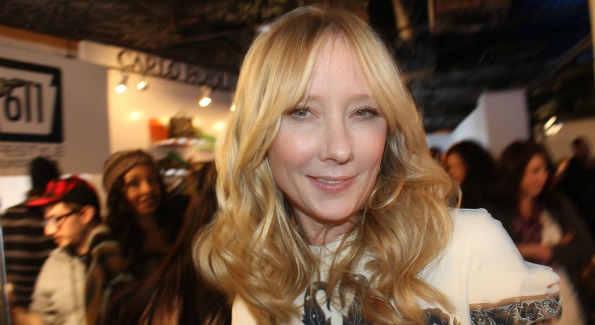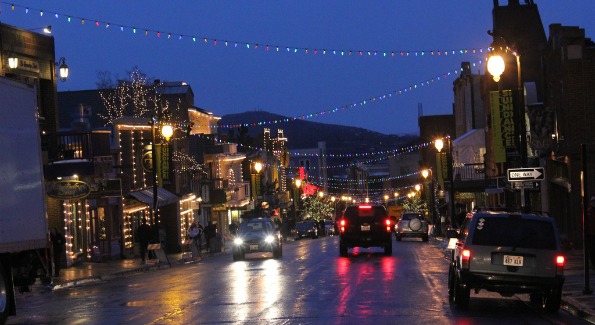Inside scoop from festival founder and actor Robert Redford.
By John Arundel

The Wasatch Mountain Range of Utah, with Park City and the Sundance Labs in the distance. (Photo by John Arundel)
“Sundance is not Park City,” said legendary actor Robert Redford in his annual “state of the festival” press conference Jan. 19 at the Egyptian Theatre. “It’s a place where this all started back in the 1980s when I started up the labs”.
Sundance Institute‘s Founder and President, Redford, made it clear that Park City and Sundance are two different places. The labs are at the Sundance Resort, about 40 miles away from Park City where Redford and his team, including Keri Putnam, executive director of the Sundance Institute, and John Cooper, director of the Sundance Film Festival, encourage young filmmakers to develop and create their films. “The festival is a part of the Sundance Institute, but in my mind, the stronger part, the more meaningful part, is the development part where our labs are,” said Redford.
The filmmakers labs have expanded because of the film festival’s success. “We are able to include: documentary labs, short-film labs, and producer labs: all those elements that have to do with storytelling,” Redford said.
With Internet and cable, success in distribution these days takes on many forms. At the Sundance Institute, a new program called Artist Services helps filmmakers pursue a self-distribution strategy. Redford and his team have helped new artists raise more than $1.5 million, on Kickstarter.com, to fund their projects. Sundance-supported films, past and present, are given access to the top online distribution portals.
“I think it’s creative and original. The stories you see are as diverse and personal as they can be,” Redford said. “Independent film is the theme of the festival. I hope you see that too.”
Independent films have the ability to move, inform and inspire people, and make change. Putnam said journalists and filmmakers are facing changes in: distribution, globalization, and technology, which have become priorities at the institute.
“In many ways, the festival is a true embodiment of what we do at the institute year-round,” she said. “In a concrete sense, you can see that in the 27 feature films that will be screened in this year’s festival that were supported creatively or financially by the institute.”
Sundance began in Salt Lake City in 1978, as the “Utah/US Film Festival,” an effort by the state government to attract more filmmakers to Utah. Chaired by Redford, it was founded by Sterling Van Wagenen, previous head of Wildwood, John Earle, and Cirina Hampton Catania, who were serving on the Utah Film Commission at the time.
That first festival in ’78 featured films that are now classics including “Deliverance”, “Midnight Cowboy”, and “A Streetcar Named Desire”. The goal was to showcase strictly American-made films and to celebrate the Frank Capra Award, which that first year went to the legendary actor Jimmy Stewart. The festival made a profit in its first year.
Even with its expansion and success, the institute’s mission hasn’t changed much since it was founded in 1979, one year after the first festival was held.
“Our mission is pretty simple,” Redford said. “It is creating a platform for independent artists to show their work. This is the only festival I know is truly independent in the world, and it’s the only festival that has a year-round workshop attached to it.”
At 78, looking slim and vibrant, Redford shows no outward signs of slowing down, either personally or professionally. His Sundance Institute and Festival have become global institutions, and his team makes it clear that they’re aggressively pursuing his desire for Sundance to be at the intersection of technology and storytelling, globally.
“Today, 30 percent of the artists at the institute are international,” Putnam said. “This year we are going to hold labs and workshops in China, India, Jordan, and East Africa”.
Last fall, the institute set up the New Frontier Lab, and launched Film Forward, a traveling film festival that takes 10 films on the road, with a goal of engaging audiences and broadening cross-cultural understanding. This April, the Sundance Institute will present Sundance London, a collaboration between the institute and AEG, owner of the O2 Arena in London.
“It’s going to be a four-day music and film festival that will give us the opportunity to expand our reach”, said Putnam. “The 2012 Sundance Film Festival is proof the independent-film community is healthy.”
At the premier showcase for new work from American and international independent filmmakers the 10-day festival comprises competitive sections for; American and international dramatic and documentary films, both feature-length films and short films, and a group of out-of-competition sections, including: NEXT, New Frontier, Spotlight, and Park City at Midnight.
For his part, Redford at the opening news conference expressed discomfort with what he called “leveragers”, people who come to the festival to advance their products or their agendas beyond the scope of independent filmmaking. The media extravaganza for Hollywood celebrity actors and wannabes, the paparazzi and the luxury lounges set up by companies not affiliated with Sundance or filmmaking. Starting in 2007, festival organizers tried to curb these activities with their “Focus on Film” campaign.
“Now, it’s a free country, there’s nothing we can do about that,” Redford said, without getting specific. “But we are a nonprofit, and there’s very little that we can control. But we have to work harder and harder to point that out…Sometimes it’s been hard for me.”
With the 2012 Presidential election, Redford had even more to get off his chest. “In terms of politics and Mitt Romney…I’m not gonna get into politics,” he said. “The fact is, you can see with the debates going on, this mushroom cloud of ego hovering over everybody. It’s kind of silly and stupid, and I’m sorry about that.”






